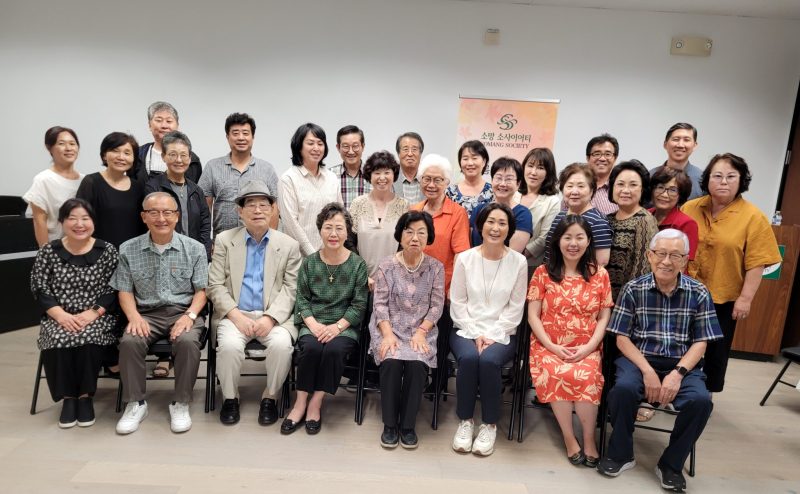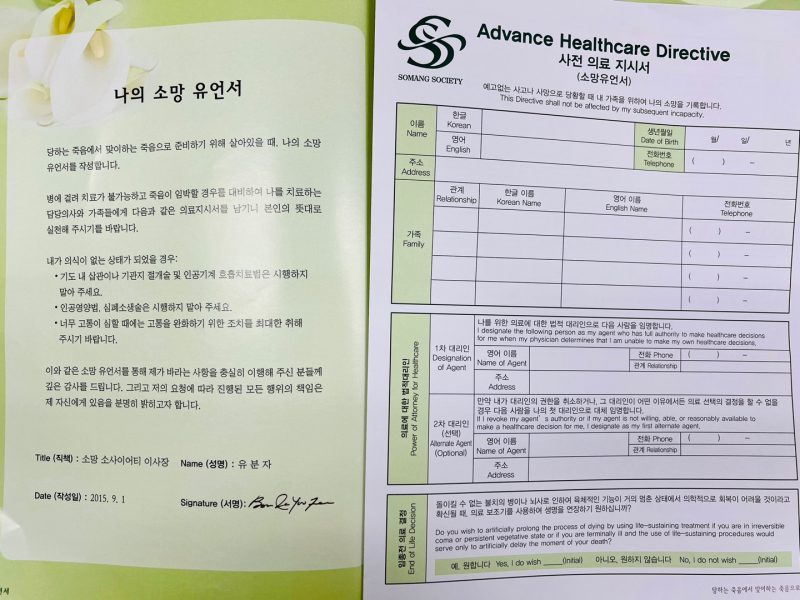[The Korea Daily-USC: Healing California Project]
A lonely funeral for a Korean-American elderly man was held at Dae Han Mortuary in Koreatown.
A Korean-American man in his 70s died suddenly after losing contact with his family. A church pastor who knew him searched for his family but could not find them. With the help of the pastor, the body was given a simple funeral and cremation.
According to the professionals in the industry, more Korean-American elders die alone than one might think, most of whom pass away suddenly and without preparation. Many of them are men in their 60s and 70s, mostly alone in senior apartments and rented houses.
The reasons behind Korean-American loner deaths are often mental health problems such as addiction. Most of these lonely deaths leave behind destroyed homes.

“We hold funerals for about seven to eight lonely Korean Americans a year,” said Michael Lee, CEO of the Dae Han Mortuary. “Some of them pass away empty-handed. They suffer from mental health problems such as alcoholism and gambling addiction, and a lot of them are abandoned by their families.”
Lee, who has seen many deaths as a funeral director, emphasizes “preparing to die”. “When I’m asked to speak at churches and other places, I tell them, ‘You should always be prepared when around your 80s,’” he said. “Making a will while you’re still alive and planning for even minimal funeral expenses ($1,700 to $4,000) can prevent family feuds after the funeral.”
Do not hesitate to talk about death
Preparing for death is often seen as a foreign concept. “Eastern cultures, like Korean Americans, emphasize life in this world rather than the afterlife, so it’s not common to see people trying to prepare for death in advance,” said Sun Chul Hwang, CEO of Hansol Insurance.
Founded in 2007, Somang Society began its activities with the goal of changing the Korean community’s perception of death.
The organization’s “Well Being, Well Aging, and Well Dying” campaign aims to create a “beautiful life and a beautiful end”. Dementia diagnosis and coping, advance directives, and body donation pledges are among the most important activities. The senior-led organization emphasizes the need for seniors to be aware of their physical and mental health and to prepare for death in a way that brings emotional stability.
“In Korean culture, it’s taboo to talk about death,” says Boon Ja Yoo, 89, president of the Somang Society. ”We need to take the topic of death out for serious communication. If you don’t do that and you die suddenly, everyone, including your family, will mostly panic.”
Preparing seniors for their own deaths has also been shown to have positive mental health benefits.
Young Hwa Choi, a senior community health worker at the Los Angeles County Department of Mental Health, said, “There is a lot of negativity about death in the Korean-American community,” and added, “Positive thoughts and attitudes about death can be important for senior mental health and well-being, giving them a more positive outlook on life and the opportunity to make each day count.”
“It can also help overcome feelings of ‘getting old and useless,’ and it can lead to more fulfilling relationships with loved ones.”

Dying with dignity, your preparation and choice
To promote “well-dying” awareness, The Somang Society has been campaigning for people to complete an Advanced Healthcare Directive.
The idea is for people to decide how they want to die, with dignity.
An Advanced Healthcare Directive is a document that seniors sign that sets out their ‘pre-death medical decisions’ and ‘post-death funeral decisions’. It is legally binding upon signing but can be revised while you are still conscious before you die.
The advance directive is a yes or no answer to the question, “If I am physically incapacitated due to an irreversible, terminal illness or brain death, and I am certain that medical recovery is unlikely, do I want medical assistance to prolong my life (such as intubation, bronchotomy, ventilator treatment, artificial nutrition, cardiopulmonary resuscitation, etc.”
For funeral decisions after death, you can list the funeral arrangements (organ donation, burial, cremation, body donation, and others), funeral director, or body donation organization.
To be legally enforceable, the advance directive must also be signed by the person stating their wishes and signed by two witnesses.
“The ability to decide how they want to die is linked to ‘human dignity,’” says Hye Won Shin, Director of Asian American Community Outreach of the UC Irvine Institute for Memory Impairments and Neurological Disorders (UCI MIND). “Without an advance directive, if you lose consciousness due to serious illness or other conditions, you may be forced to receive treatment you don’t want until you die.”
“Instead of fearing death, people who have completed an advance directive express satisfaction that ‘I can end my life the way I want to end it,’ and they say they have left the best gift to their children, especially as it relieves them of burdens such as guilt,” Shin added.
The well-dying campaign also requires a proactive approach. Choi said “Emphasizing well-dying to seniors who are unprepared for the idea of death can lead to rejection, anxiety, and trauma. It is also important to ask for informed consent when conducting seminars about death.”
BY HYOUNGJAE KIM, HOONSIK WOO [woo.hoonsik@koreadaily.com]





